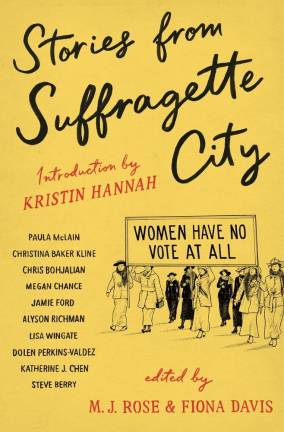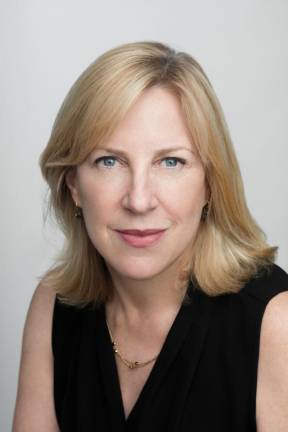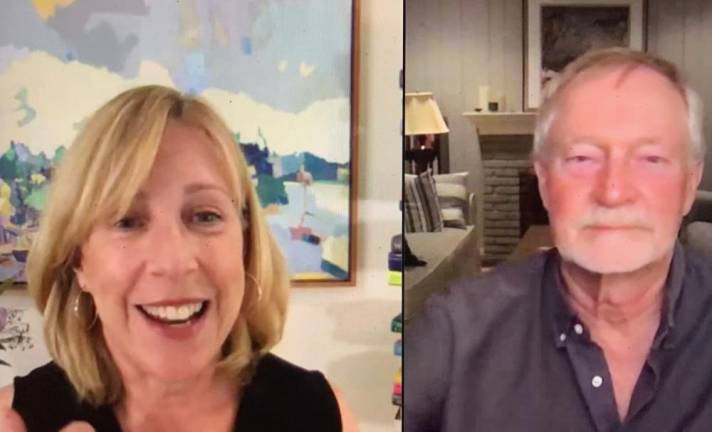Finding Strength from the Stories of New Yorkers Who Paved the Way
Christina Baker Kline on Zoom book events, camaraderie with fellow authors and writing historical fiction set in the city



The timing of the release of “Stories from Suffragette City” is not lost on Christina Baker Kline who said, “To me, this anthology is about understanding, reinforcing and valuing the right to vote.” The bestselling author with a penchant for penning historical fiction was asked by editors Fiona Davis and M.J. Rose to contribute a short story to their collection. The work features pieces from 13 bestselling authors, all set on October 23, 1915, the monumental moment in our city’s history where over 25,000 women marched down Fifth Avenue in solidarity, petitioning for the right to vote.
For her part in the compilation, Kline chose to write about a fictional 11-year-old Irish immigrant who was taken to the Children’s Aid Society, an organization in Manhattan that housed children who had nowhere else to go. From there, the girl was meant to be put on an orphan train, part of a labor program where 250,000 were sent on trains for over 75 years, that ended in 1929.
As for her research into the period, the South Harlem resident who has been quarantining in Maine, had already immersed herself in that era in New York for her novel, “Orphan Train,” which spent more than two years on the New York Times best seller list. Her newest novel, “The Exiles,” was published in August and she’s been learning the art of promoting a book in quarantine, which although daunting at first, she has come to embrace. “On the one hand, it’s harder and less connected to people,” she began. “But, on the other hand, Zoom allows me to be in conversation with writers I admire and respect who live, as I do, in far-flung places.”
Tell us about your contribution to “Stories from Suffragette City.”
My story in the collection is called “The Runaway” because it’s about a girl who is about to be put on an orphan train and she runs away. And it’s sort of an awakening story because she falls into this march that happens to be on the same day, and she slowly realizes that things could be very different for her and that her whole life could be greatly affected. And so that was a joy.
In your story, your character is taken to the Children’s Aid Society. Can you explain what that was?
It was the first major orphanage in New York City and it was started by this man named Charles Loring Brace in the 1860s. And he’s the one who started the orphan trains. Brace was a humanitarian and a really interesting guy, but the orphanages were not pleasant places to be. There were 30,000 children living on the streets of New York City, and I mean, these kids were homeless. There were no special programs or safety nets, no welfare, no foster care, when all of this started. So the only thing he could think of to do was first to put them in an orphanage and when that filled up, he had to put them in the county jail in cells with prisoners because there was nowhere else for him to put these children. And that was how he devised the orphan train idea. He saw it as a way to take care of them.
You already knew much about that time period from writing “Orphan Train.”
In my novel, things sort of get going around the time that this march happened in real life. And my characters moved from Ireland to New York City, and then there’s a fire and my central character gets put on an orphan train to the Midwest. So I was able to revisit the period of the “Orphan Train,” and to write about another child’s experience. I already knew the time period pretty well because I had written this novel about it, about immigrants in New York City, so I sort of knew that world. But I didn’t know the particulars of the march, and I was able to see dozens of photographs. I read all these accounts of what happened that day. And I actually wove in a real-life character.
I was going to ask you about her. So she’s real, the niece of the owner of Tiffany?
Yes, and as I understand it, originally, they [the editors] had an idea that this character would be woven through everyone’s story in the book. And then that became a little unwieldy, but I chose to do it anyway. The wrote us and said, “We figured out that this might not work for everyone.” And I said, “I think I found the perfect way to use her.” And again, it’s another kind of awakening for my character, to meet this one girl. So I enjoyed that aspect of it. And my last three novels have all taken place in the past and all of them have, at one point or another, used a real historical figure in some way.
As for the other authors in the book, are you all friendly with one another?
It’s been so much fun being part of this email group with them. And we’re all figuring out which events to do, some of us are on panels together, other people are giving talks. It was supposed to be in-person, of course, so we would have all been meeting each other and hanging out together. I already know a bunch of them in real life, Jamie Ford, Paula McLain, M.J. and Fiona [Davis], Kristin Hannah. But we’ve had real camaraderie around doing these pieces together. It’s fascinating to see how all of these authors approach the same prompt differently.
Your book “The Exiles” was released in August. What was it like to promote it during quarantine?
I have been in a strange position, because my book came out and I’ve been doing tons and tons of events, but they’re all virtual. Lots of libraries and bookstores and other organizations are doing these. I keep being afraid that Zoom fatigue will set in. When you’re promoting a book during a pandemic, I’ve come to learn, it’s a lot more work for the author. Because social media is so important, getting out the word online. Whereas when you have the apparatus of a publisher behind you when you’re going on tour and all of that, it’s very different. So that has been really an eye-opener.
I read an interview with you that said you still write with a pen and pad. Is that true?
I do! I write longhand. I know, it’s so weird. There are a bunch of my friends who are writers who still write longhand. For me, there’s something about the tactile experience of pen on paper. I might cross through something, but I can come back to it. And honestly, I often do come back to it, so to me, having that first draft on paper is the only way I can work. When I sit down with a blank screen, I can do nonfiction that way, I can write essays, but I just find that the creative process for me is connected to having a pen in my hand.
What are you working on now?
I’m working on a new novel. I thought I might be going back to contemporary fiction, but apparently not quite yet. My new novel is based in Civil War-era North Carolina. It’s a family story from my own family.